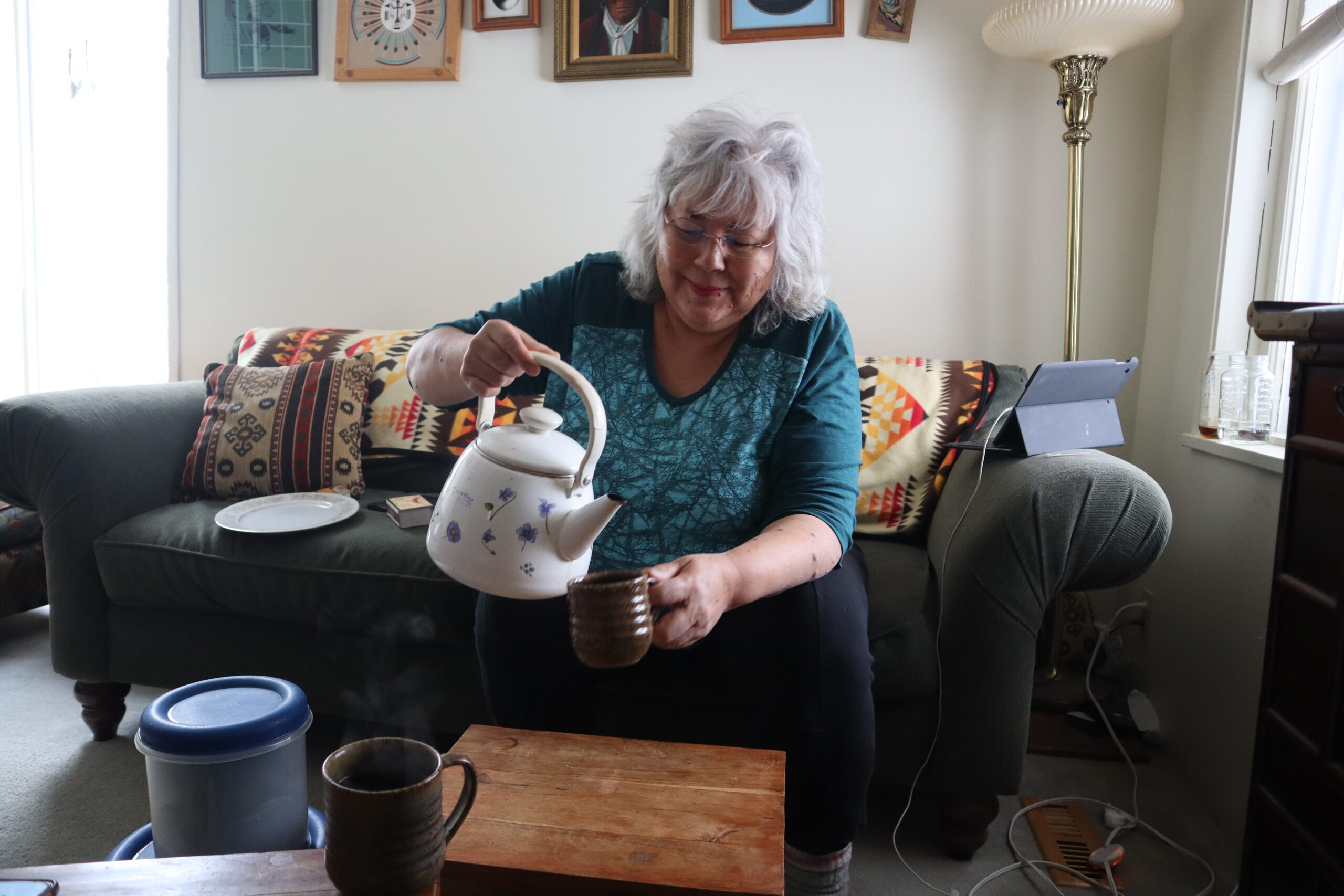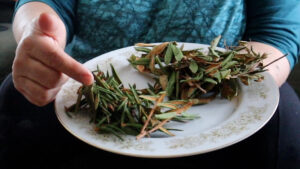
Indigenous Knowledge Holder Barb Frazer shares a cup of maskêk (Muskeg) tea with me and tells us how the land is responding the climate crisis. Photo by Lori Deets.
Barb Frazer explains why not having access to medicines is an emergency alert we should all listen to.
We have always known
Indigenous people have long spoken about a coming time of climate change
by Lori Deets
Barb Frazer has been picking muskeg tea and other traditional medicines north in the boreal forest ever since she could walk.
But when Frazer went back to pick her tea this year, she was shocked at what she found — or, rather, did not find. Muskeg which has always been so plentiful was now quite sparse.
Frazer is a Knowledge Holder with a minor in botany. She has studied the medicinal qualities and usage of plants and their healing capacity, however her knowledge of the land reaches further than just medicine. Frazer is dependent on the land to keep her supplied with medicine as well as for food.
“It was frightening, sad and emotional to think we might not be able to get muskeg tea anymore.”
– Barb Frazer, Knowledge Holder
“I was so shocked,” recalls Frazer. “It was very, very hard. It was frightening, sad and emotional to think we might not be able to get Muskeg tea anymore.”

Frazer adds, “Climate change is not something new. We knew it was coming.”
The grandparents have always prophesized through story that we would see a time that, where it was always warm, we would see cold; and where it was always cold would see warm, Frazer explains. She says we are beginning to see that shift now.
Although we knew from our Indigenous Grandmothers and Grandfathers it was coming, we have not done our responsibility to Mother Earth, including the stewardship, caretaking and how we position ourselves on Mother Earth, she says.
Frazer says she has always prayed for the seeds and land for they have much work to do. This year there was hardly any rain to help them grow.
Frazer has adapted by finding seeds that are more drought-resistant and by covering her plant rows with leaves to keep in moisture. The knowledge of the droughts of previous years is still alive.
The dry summer this year caused scarcity not just for muskeg but also for berries, sage and many other staples that Traditional Knowledge Holders like Frazer depend on.
Those who depend on the land had to do things differently this past year. Frazer blanched many of her vegetables and dehydrated roots and leaves using parts of the vegetables she normally would not use.
Frazer lives according to a zero-waste principle, using all parts of plants and vegetables and making use of compost. She used the leaves of her carrots to make a delicious pesto seasoning, for example.
Frazer’s relationship with the land is remarkable. It shows in how she talks, how she lives and how she responds to life and her surroundings. As we continued to talk about climate change and her teachings, the tremendous respect she has for her culture, her teaching and the land was clear.
Frazer says it was so hard this year to see the state of our land. “She, too, is sick, just like we are all sick with all the intergenerational trauma and the sickness of our emotional, mental, physical and spiritual well-being,” she says. “What we refer to our social determinants of health are very much evident in all of us. She, too, is at that very state. We need winter, she needs to rest.”
“Climate change is here and it is calling on society to be strong.” – Barb Frazer, Knowledge Holder
She adds, “I have come to understand how deep and profound nehiyaw (Cree) language is. How you position yourself on Mother Earth (LLLL). She, too, is a living being that needs to hear those prayers and those offerings — the caretaking on a spiritual level.
“Climate change is here and it is calling on society to be strong. We have to find emotional, spiritual, and physical strength to be able to meet the challenges like food sovereignty that are coming. How we aspire to meet the needs and challenges of the climate change crises like the windstorms, fires, drought and heat, will show our strength. We are going to see things that we never thought we would,” she says.
According to Frazer, what we do and how we help one another will be how we get through all that is going on in the world. Within our world into our communities and in our homes. Helping one another come to a good place mentally and emotionally. We are then thinking about others but also about how we do things better. think in a different way
Frazer expands that thought. “System’s thinking requires of us to say, that is my mother you are sitting on, that’s my mother you are throwing garbage on. System’s thinking says I am a part of that. If that is your relative it forces you to act in a very principled, and loving and kind way.”
The Indigenous ways of being require a different mindset. Indigenous people have known the climate change was coming for some time. Society has been talking climate change just this century and the Indigenous narrative is just now beginning to be heard, thanks to Knowledge Holders and educators like Frazer.
"Climate change is not something new. We knew it was coming".

Lori Deets is Métis-Cree born in northern Saskatchewan. Being a 60’s Scoop relocated to southern Saskatchewan, Lori now calls Moose Jaw home. Lori is a student at First Nations University of Canada and will recently be finished her Indigenous Communications Arts Diploma, where she has gained experience with print journalism, radio and podcasting. Lori is also passionate about social justice, decolonization and anti-racism. She enjoys finding various artistic ways to inform and educate in these areas.
One thought on “We have always known”
Comments are closed.

Good article! Very interesting!!!